Dear Readers, SBI Clerk (Junior Associates) 2018 Preliminary Examination is scheduled to be held on 23rd, 24th, and 30th of June 2018. In that case, aspirants need to speed up the preparation as there are only few days more.
To boost up your exam preparation, Our IBPS Guide team is providing a full length Sectional Tests for English, Quantitative Aptitude and Reasoning with detailed solutions to score more marks in the prelims exam. Make use of this opportunity and recommend to your friends to achieve a successful career in Banking.
You can also practice using our SBI Clerk Test Series pack prepared by our experienced professionals as per the latest exam pattern. We wish you a great success in all forthcoming exams. Click Here for SBI Clerk Practice Mock Test
Minimum Cut Off for this Quantitative Aptitude Section Test is: 23
[WpProQuiz 2510]
Click “Start Quiz” to attend these Questions and view Solutions
Direction (1-5): Read the following information carefully and answer the questions given below.
Seven friends H, I, J, K, L, M and N likes different beverages viz., Coco-Cola, Frooty, Fanta, Thumbs-up, Sprite, Pepsi and Appy but not necessary in the same order. Each friend is also has a different cars namely Tata, Nissan, Chevrolet, Ford, Audi, Toyota and Mahindra but not necessary in the same order.
M has Tata car and likes neither Thumbs-up nor Sprite. The one who likes Frooty has Nissan car. H likes Fanta and has neither Ford nor Audi car. The one who likes Coco-Cola has Mahindra car. I have Toyota and does not like Sprite. The one who like Sprite does not have Audi car. K likes Pepsi. N does not have Nissan and does not like Sprite. L does not like Sprite.
- Which of the following Car does L have?
- Ford
- Nissan
- Tata
- Chevrolet
- None of these
- Four of the following five alike in a certain way and thus form a group. Which of the following one that does not belong to the group?
- K – Pepsi
- H – Fanta
- N – Coco-Cola
- J – Appy
- M – Tata
- Which of the following combination is definitely true?
- H – Tata – Fanta
- I – Audi – Pesi
- M – Tata – Appy
- N- Toyota – Coca-cola
- None of these
- Which of the following person has Toyota car?
- J
- H
- L
- I
- K
- Which of the following beverage does K likes?
- Frooty
- Fanta
- Appy
- Coco-Cola
- Pepsi
Direction (6-8): Read the following information carefully and answer the questions given below.
Nine members in a family are P, Q, R, S, T, U, V, W and X. In that there are three couples and three generations in the family. X is only granddaughter of Q. P is the mother of U. T is the father of P. W is son in law of V. S is only daughter of R. Q is mother-in-law of P. W is brother of S.
- How is W related to T?
- Son
- Brother
- Son-in-law
- Father-in-law
- None of these
- If S is married to Y, then how is W related to Y?
- Father
- Brother
- Nephew
- Brother-in-law
- Son-in-law
- How is U related to S?
- Brother
- Nephew
- Father
- Niece
- None of these
Direction (9-10): Read the following information carefully and answer the questions given below.
Ankur is 10m to the north of Saurav. Dharmesh is 10m to the west of Saurav and Gautam is 4m to the north of Dharmesh. Manish is 6m to the west of Gautam. Rajeev is 8m to the north of Maneesh. Rithish is 4m to the east of Rajeev.
- If Mukesh is 4m to the south of Dharmesh, then what is the shortest distance between Mukesh and Manish?
- 6
- 8
- 5
- 10
- None of these
- When Rupesh is 3m south of Rajeev, then Rithish is in which direction with respect to Rupesh?
- North-east
- South
- South-west
- North-west
- East
Direction (11-15): Study the following information carefully and answer the questions given below:
Eight friends A, C, E, G, I, K, M and O are sitting around a circular table with equal distance between them but not necessary in the same order. Some of them are facing the centre while some are facing outward (i.e., opposite to the centre).
E sits second to the right of O. O faces the centre. Only three people sit between C and E. M sits to the immediate right of C. A sits to the immediate right of G. G and C faces the same direction (i.e., if G faces the centre then C also faces the centre and vice-versa). I sits third to the right of E. I is not an immediate neighbour of A. E and I faces opposite directions (i.e., if I faces the centre then E faces outward and vice-versa). The immediate neighbours of C face the same direction (i.e., if the one faces the centre then the other also faces the centre and vice versa). Both A and K faces the opposite direction to that of G. (i.e., if G faces the centre then both A and K face outward and vice versa).
- Who sits third to the right of E?
- M
- I
- O
- G
- None of these
- What is the position of G with respect to I?
- Third to the right
- Second to the left
- Second to the right
- Immediate left
- Third to the left
- How many persons sit between M and O when counted from the right of M?
- None
- One
- Two
- Three
- None of these
- Four of the following five are alike in a certain way based on the given arrangement and so form a group. Which is the one that does not belong to that group?
- A
- K
- I
- G
- M
- Which of the following is true regarding to A?
- A is immediate left of G
- K is second to the right of A
- A is third to the right of C
- O is third to the right of A
- None is true
Directions (16-20): Read all the statements and then decides which of the given conclusions logically follows from the given statements disregarding commonly known facts.
- Statements:
Some books are novels.
All novels are magazine.
No magazine is a paper.
All pens are paper.
Conclusions:
I. All books are pens is a possibility.
II. No pen is novels.
III. No magazine is book
- Both II and III follows
- Both I and II follows
- Only II follow.
- All follow
- None of these
- Statements:
All fruits are flowers.
Some sweets are flowers.
All grains are sweets.
No pulse is sweets
Conclusions:
I. No pulse is grain.
II. Some grains are flowers.
III. All pulses are flowers are a possibility.
- All follows
- Only I and III follow
- Only II and III follow
- None follows
- Only I and II follows
- Statements:
Some athletes are runners
All runners are cricketers
No cricketer is a dancer
Conclusions:
- All dancers being athletes is a possibility
- All athletes being cricketer is a possibility
- All runners being athletes is a possibility
- Only I follow
- Only II follows
- Both II and III follows
- None follows
- None of these
- Statements:
All yellow are black.
All black are grey.
No grey is green.
Some red are yellow.
Conclusions:
I. No yellow is green
II. Some red are grey
III. Some black are red.
- Both II and III follow.
- Only I follow.
- All follows.
- Both I and III follows
- None of these
- Statements:
Some cows are pets
All pets are dogs
No dog is cat
Conclusions:
- Some cows being cat is a possibility
- All dogs are pets
- Some dogs are definitely cat
- Only I follows
- Only II follows
- Both I and II follows
- Only III follows
- None follows
Direction (21-25): Read the following information carefully and answer the questions given below.
Seven persons A, B, C, D, P, Q and R are sitting in a straight line facing north and they are like different colours viz., White, Black, Blue, Red, Green, Pink and Yellow. All the above information is not necessary in the same order.
There are only two persons sitting between A and the one who likes Black. D sits immediate left of the one who likes Green and does not like Red. Q sits second to the left of R and does not like Black. More than three persons sits between the one who likes Yellow and P, who sits at one of the extreme ends of the line. R sits fourth to the right of the one who likes Red and none of them sits at the extreme end of the line. A is not an immediate neighbor of both Q and R. The one who likes White does not sits to the right of C. The one who likes White sits to the right of A. B sits second to the left of C, who likes Pink.
21. Which of the following colours does R likes?
- Red
- Yellow
- Blue
- White
- Green
22. Who sits second to the right of the one who likes Green?
- The one who likes Yellow colour
- The one who likes Black colour
- The one who sits to the immediate left of P
- The one who likes Red colour
- None of these
23. How many persons sitting between B and the one who likes Red?
- None
- One
- Three
- Two
- More than three
24. If D and B are interchange their position, then who among the following sits third to the right of B?
- Q
- The one who likes Green.
- The one who sits to the immediate left of C
- The one who likes White colour
- None of these
25. If ‘D’ is related to ‘Black’ and ‘B’ is related to ‘Pink’. Then ‘P’ is related to which of the following?
- Blue
- Yellow
- Green
- Red
- White
Directions (26 – 30): In each question below is given a group of letters followed by four combinations of digits/ symbols numbered (a), (b), (c) and (d). You have to find out which of the combination correctly represents the group of letters based on the following coding system and the conditions that follow and mark the number of the combination as your answer. If none of the combination correctly represent the group of letters, mark (e) i.e., ‘None of these’ as your answer.
| Letter | H | L | P | A | I | O | G | Z | M | E | Q | B | K | S | W |
| Digit/ Symbol Code | $ | 3 | 1 | 4 | @ | 2 | 5 | © | 8 | 7 | & | 6 | % | # | 9 |
Conditions
(i) If the first letter is a vowel and the last letter is a consonant both are to be coded as *
(ii) If both the first and the last letters are vowels both are to be coded as the code for first letter.
(iii) If the first letter is a consonant and the last letter is a vowel their codes are to be interchanged.
26. OBKSWA
(a) 26%#92
(b) 46%#92
(c) 46%#94
(d) *6%#9*
(e) None of these
27. PAOLHW
(a) 9423$1
(b) 1423$9
(c) 9423$9
(d) 1423$1
(e) None of these
28. EQZOGS
(a) 7&©25%
(b) %&©257
(c) *&©25*
(d) 7&©257
(e) None of these
29. QIABKH
(a) &@46%&
(b) $#46%&
(c) *@46%*
(d) $@46%$
(e) None of these
30. MPHGBO
(a) 81$562
(b) 81$568
(c) 21$562
(d) 21$568
(e) None of these
31. How many meaningful English words can be made with the letters “TDEI” using each letter only once in each word?
- None
- One
- Two
- Three
- More than three
32. Each consonant in the word “TRADERS” are replaced by the previous letter as in the English alphabet and each vowel are replaced by the next letter as in the English alphabet. The letters in the new word are arranged in alphabetically from left to right. Which of the following will be the fourth from the right end?
- B
- Q
- F
- C
- R
33. Pointing to a boy, Rahul said “He is the son of my grandfather’s only child”. How is the boy related to Rahul?
- Son
- Nephew
- Brother
- Data inadequate
- Father
34. In a row of twenty five students facing North. P is 16th from the right end and S is 18th from the left end. How many students are there between P and S?
- 9
- 6
- 4
- 8
- None of these
35. How many such pair of letters is there in the word “SPECULATE” each of which has as many letters between them in the word as in the English alphabet?
- None
- One
- Two
- Three
- More than three
Answers:
Direction (1-5):

1. Answer: (b)
2. Answer: (d)
3. Answer: (c)
4. Answer: (d)
5. Answer: (e)
Diretion (6-10)
6. Answer: (c)
Son-in-law

7. Answer: (d)
Brother-in-Law
8. Answer: (b)
Nephew
Direction (9-10):

9. Answer: (d)
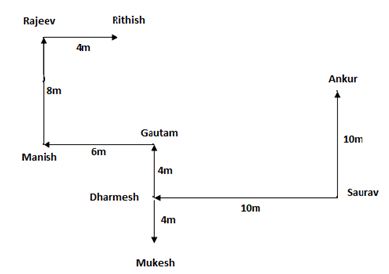
10. Answer: (a)

Direction (11-15):

E sits second to the right of O.
O faces the centre. Only three people sit between C and E.
M sits to the immediate right of C.

A sits to the immediate right of G.
G and C faces the same direction (i.e, if G faces the centre then C also faces the centre and if G faces outward then C also faces outward).
I sits third to the right of E.
I is not an immediate neighbour of A.

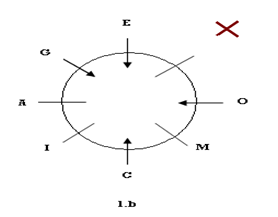
E and I faces opposite directions (I.e, if I faces the centre then E faces outward and vice versa).
The immediate neighbours of C face the same direction (i.e, if the one faces the centre then the other also faces the centre and vice versa).
Both A and K face a direction opposite that of G. (i.e, if G faces the centre then both A and K face outward and vice versa).
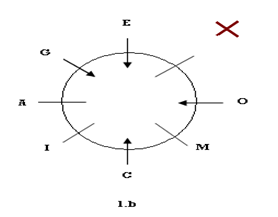
11. Answer: (b)
12. Answer: (e)
13. Answer: (c)
Answer: (d)
15. Answer: (c)
Direction (16-20)
16. Answer: c) Only II follow.
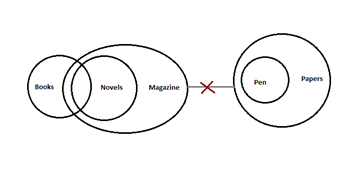 17. Answer: b) Only I and III follow
17. Answer: b) Only I and III follow
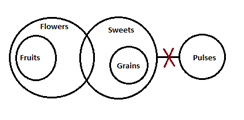
18. Answer: e) None of these

19. Answer: c) All follows.

20. Answer: a) Only I follows

Direction (21-25)

R sits fourth to the right of the one who likes Red and none of them sits at the extreme end of the line.
Q sits second to the left of R and does not like Black.

D sits immediate left of the one who likes Green and does not like Red.
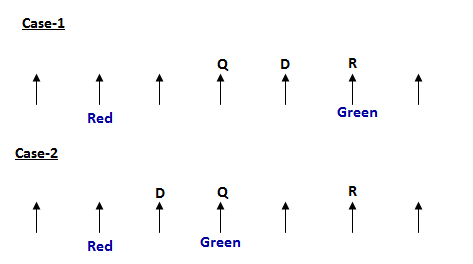
B sits second to the left of C, who likes Pink. There are only two persons sitting between A and the one who likes Black.
A is not an immediate neighbor of both Q and R.
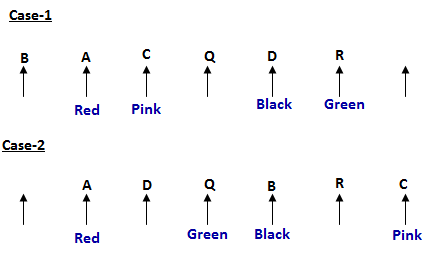
More than three persons sits between the one who likes Yellow and P, who sits at one of the extreme ends of the line. The one who likes White does not sits to the right of C. The one who likes White sits to the right of A.
So, Case-1 will be dropped.
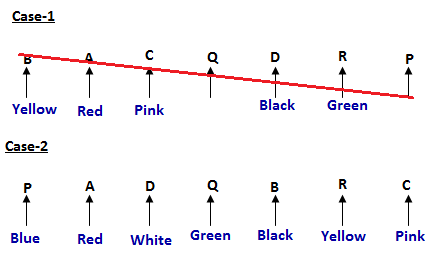
21. Answer: (b)
22. Answer: (a)
23. Answer: (d)
24. Answer: (c)
25. Answer: (e)
Direction (26-30)
26. Answer: (a)
| O | B | K | S | W | A |
| 2 | 6 | % | # | 9 | 2 |
Condition II Follows.
27. Answer: (b)

28. Answer: (c)
| E | Q | Z | O | G | S |
| * | & | © | 2 | 5 | * |
Condition I Follows.
29. Answer: (e)
| Q | I | A | B | K | H |
| & | @ | 4 | 6 | % | $ |
30. Answer: (d)
| M | P | H | G | B | O |
| 2 | 1 | $ | 5 | 6 | 8 |
Condition III Follows.
31. Answer: (e)
DIET, TIED, TIDE, EDIT.
So, only one meaningful word is formed.
32. Answer: (b)
| T | R | A | D | E | R | S |
| S | Q | B | C | F | Q | R |
| B | C | F | Q | Q | R | S |
So, Q is fourth from the left end.
33. Answer: (c) Brother

34. Answer: (e) None of these

Seven students are between P and S.
35. Answer: (c)






